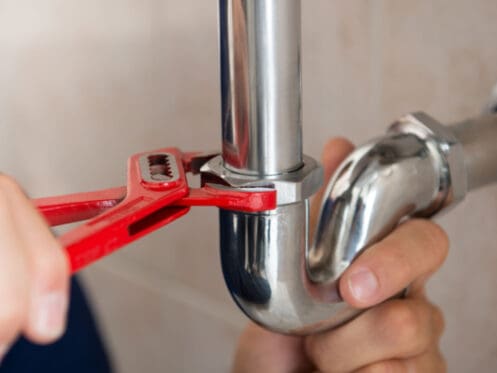An essential part of homeownership is keeping your plumbing in good condition. Your plumbing system is one of the most critical components of your home and is responsible for delivering clean water and removing wastewater. Plumbing problems can cause inconvenience, water damage, and even pose health risks to you and your family members. Regular maintenance and repair of your plumbing system can prevent costly and unexpected breakdowns and prolong the life of your plumbing fixtures and appliances. Keeping your plumbing in good condition is not only important for your comfort, but also for your safety and peace of mind.
When Repair Isn’t Enough
Several circumstances may arise with your plumbing where repair is no longer a viable solution. In these cases, repiping may be necessary to ensure you can comfortably use your home. If your plumbing system is old and has not been replaced or updated in many years, it may be more cost-effective to repipe rather than to continue making frequent repairs. Frequent leaks in your plumbing system can indicate that the pipes have deteriorated and are no longer able to hold up to the demands of your household. If you are experiencing low water pressure throughout your home, this may be a sign that your pipes are corroded or clogged with mineral buildup, and may need to be replaced. Additionally, if you notice that the water coming out of taps and tub faucets has a strange taste, color, or odor, this may indicate that your pipes are corroded and need to be replaced. Planning a major renovation? If you are, it may be necessary to repipe in order to accommodate the new layout or plumbing fixtures.
If your plumbing is no longer effective, repiping can be a cost-effective option that will preserve and protect your plumbing system. Consulting with a licensed plumber will determine the best course of action for your specific situation.
What Is Home Repiping?
Home repiping is the process of replacing all or a portion of the existing plumbing pipes in a home. This may include replacing the main water supply line, the sewer line, or the pipes that distribute water throughout the house. The process involves removing the old pipes and installing new ones, which may be made of copper, PEX, or other materials. Repiping can improve the overall water quality in your home, increase water pressure, and reduce the likelihood of leaks and other plumbing issues. It is a complex process that requires the expertise of a licensed plumber, and the cost can vary depending on the size of the home, the extent of the repiping, and the materials used.
The Process
The process of repiping a home varies depending on your specific needs and circumstances. Some general steps involved in the piping process include:
Inspection
A licensed plumber will inspect the existing plumbing system to determine the extent of the repiping needed, the materials required, and any other considerations that may affect the project.
Preparation
Your plumber will prepare the home for repiping by shutting off the water supply, draining the pipes, and removing any fixtures or appliances that may be in the way. This will allow for a more comprehensive look at pipe condition as a plan for repiping is made, whether in sections or the whole house.
Demolition
During the demolition process, your plumber will remove the existing damaged or corroded pipes and any other materials that need to be replaced, such as fittings, valves, and connectors. It is during this time that cutting through walls and demolishing drywall may be necessary to reach all needed fixtures; a repiping process often involves patching, repair, and construction services to restore rooms in your home to their previous condition.
Installation
Your plumber will then begin to install the new pipes, fittings, valves, and connectors, following the approved plumbing codes and regulations. The type of pipes and fittings used will depend on the specific needs and budget of the homeowner.
Testing
Testing the new plumbing system is necessary to ensure that it is functioning properly and there are no leaks. This may involve pressurizing the system and checking for any leaks or defects.
Restoration and Clean Up
After work has been completed, your plumber will restore any areas that were disturbed during the repiping process, such as walls, floors, and ceilings. This may include patching drywall, replacing flooring, or painting. They will then clean up the work area, remove any debris or materials, and dispose of them properly.
While the process of repiping is complex and time-consuming, it is an important investment in the long-term health and safety of your home. Any upfront investment you make in repiping your home is something you will likely make back by avoiding repeated repairs to both the plumbing system itself and potential damage to other parts of your home caused by a failing plumping system.
How Long Does Repiping Take?
The duration of a repiping project varies depending on several factors, such as the size of your home, the complexity of the plumbing system, the materials used, and any unforeseen issues that may arise during the project. On average, repiping a single-family home can take anywhere from one to two weeks to complete.
Some homeowners may choose to break up the repiping project into smaller phases to minimize the disruption to their daily routine. For example, they may choose to repipe one section of the home at a time, which can prolong the overall duration of the project.
A reputable, licensed plumber would be able to make an initial assessment of your system and give you an estimated timeline for the completion of your specific repiping project. They may also be able to make recommendations related to whether your project would be more efficiently completed if it were done in one big project or in stages. Ultimately, deciding which way to tackle this project will be up to you as it pertains to the effect on you and your family.
Benefits of Repiping Your Home
Repiping your home can provide numerous benefits that can improve your daily life, increase the value of your property, and protect your investment. Here is what you can expect from choosing to repipe your home and upgrade your plumbing system.
- Improved water pressure
- Better water quality
- Increased longevity for your plumbing system
- Enhanced home value
- Reduced risk of leaks and water damage
Getting a few estimates from licensed plumbers and contractors will allow you to make an informed decision on who is the best fit for you and your home. Don’t hesitate to ask for proof of licensing and insurance before you start a project of this scope and size; a reputable plumber will not hesitate to provide you with the necessary documentation that proves proficiency and performance.
Let’s Upgrade Your Plumbing!
{company_name] has been proudly serving valued clients in Metuchen and the surrounding areas for over 20 years. With services related to heating repair, service, and installation, AC repair and installation, water heater service, indoor air quality inspections, plumbing repair, and repiping, we work with you to design a home that meets your needs for comfort, performance, and quality. Contact us today to see how we can improve your home plumbing system with repiping solutions that will improve your quality of life.




